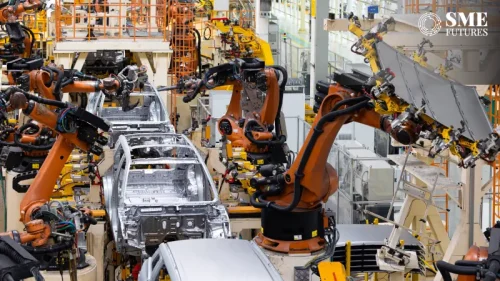According to a new report, Delhi NCR has now replaced cities such as Bangalore and Mumbai as the start-up hub of the country. In addition to housing the largest number of active start-ups, Delhi NCR leads in the number of unicorns. It has the highest cumulative private market valuation with three out of four most valuable listed internet companies driving their businesses from the city.
This is a revelation from the report titled, ‘Turbocharging Delhi-NCR Start-up Ecosytem’, which was released by the not-for -profit organisation TiE Delhi-NCR and a management consulting firm Zinnov.
Discussing the report, Rajan Anandan, President of TiE Delhi-NCR says, “NCR’s startup ecosystem has incredible momentum. What’s encouraging about the ecosystem in Delhi-NCR is, that it has a wide mix of companies across sectors which represent 23 per cent of all start-ups in India.” He even believes that NCR has the potential to become one of the top five global start-up hubs.
“The National Capital Region (NCR) region has a competitive advantage here, that the city should build on,” he adds.
Commenting on the startup scenario in NCR, Pari Natarajan, CEO of Zinnov says, “Delhi-NCR has the potential to lead innovation in many sectors across the Indian economy. Focus on ten sectors including consumer internet, consumer products, travel and hospitality, food and foodtech, next generation e-commerce, logistics, education and edutech; and mobility and EVs, can give the region an opportunity to become a start-up magnet for businesses in these sectors, by developing market shaping policies and relevant programs for the sectors.”

Surpassing Bangalore
Cities in the southern regions of the country are no more the mecca of start-ups. Recent statistics show Bangalore is no more in lead in churning out the mo st number of startups.
Bangalore lost the race with 5,234 startups to Delhi-NCR, which is currently home to 7,039 start-ups, founded between 2009 to 2019. Within Delhi-NCR, Delhi alone accounts for 4,491 start-ups, Gurugram stands at 1,544 and Noida at 1,004 for the number of new businesses.
Moreover, Delhi-NCR leads with 10 unicorns whereas Bangalore has nine. The 10 unicorns are – Oyo Rooms, Paytm, Delhivery, Hike, Rivigo, Zomato, Policybazaar, Snapdeal, ReNew Power and Paytm Mall. As per the study, 70 per cent of Delhi-NCR unicorns are B2C companies.
The report also revealed that every year, at least one start-up from the area has entered the US$ 1 billion club since 2013. These businesses form a healthy mix across sectors including fintech, foodtech, logistics, hospitality, e-commerce and energy.
The Delhi-NCR region constitutes over 50 per cent of cumulative valuation of Indian start-up ecosystem, wherein, the cumulative private market valuation of start-ups is currently worth US$ 50 billion. While, Bangalore’s overall worth stands at US$ 32-37 billion, followed by Mumbai which is approximately worth US$ 10-12 billion.

It’s also because, the three most valuable listed internet companies are based in Delhi-NCR. These are Infoedge, with a market capitalisation of US$ 3670 million; Make my Trip with US$ 2420 million; Just Dial US$ 640 million; and Indiamart US$ 490 million.
Niti Ayog’s CEO, Amitabh Kant, who released the report, says, “Vibrant hubs need to be set-up in Delhi, Gurugram and Noida, that can act as catalysts of change.” He also assured that the government will continue to support setting up of incubation centers in the region to help the start-up ecosystem.
Kant highlighted that six Indian cities – Delhi, Mumbai, Bengaluru, Chennai, Hyderabad and Pune – are among the top-100 start-up hubs globally.
“Except the US, no other country has more than five cities in the list, making India truly a broad-based start-up ecosystem,” he adds.
The reason Delhi-NCR enjoys this top status is because start-ups in Delhi-NCR leverage the city’s Capital status and garner holistic participation of all the stakeholders including government, VC, start-ups, institutions and market opportunities.

Dr. Rishi Bhatnagar, President, Aeris Communications, an IOT solutions provider, and Chairman of IET IOT panel, discusses the reasons why NCR is on top. He says, “The largest number of start-ups is attributed to Delhi NCR due to the availability of a number of state-of-the-art incubation centres, comprising 10 per cent of all such centres across India. Also, technology gave birth to the concept of ‘a liquid workforce’ and Delhi-NCR has become the most preferred region for coworking office spaces after Bengaluru, which generates more interest among young minds to set-up their workplaces here. Overall, start-ups ecosystem is on the path of making India its biggest hub, globally.”
India is home to 5000+ tech start-ups and has the third largest start-up ecosystem after US and UK. The Finance Minister, in the recent budget, promoted establishing ‘Centre of Excellence’ in India across industries.

Fewer new businesses: Concern or a silver lining?
Talking to smefutures.com, Anandan says, “These findings are extraordinary, and the next step would be more crucial as we have to accelerate from where we are.”
However, as per the figures in past two years, just as the other regions of the country, the pace with which start-ups are being founded in Delhi-NCR has also slowed down. According to the report, 1,361 start-ups in Delhi-NCR and a total of 5,875 start-ups were founded in India in 2016. The number of start-ups founded in Delhi-NCR stood at 826 in 2017, 420 in 2018 and only 142 in the first half of this year.
Overall, country numbers too depict the same pattern. A total of 3,478 start-ups were set up in India in 2017; in 2018 the number was 2,036 which further dropped to 800 in the first half of this year.

With new business formations on a downward trend, the question that arises is, if startups are on a saturation spree. On this Anandan says, “Looking at the facts, though the absolute number of startups is on a decline, there is a catch that cannot be ignored and is not even mentioned in the report.” According to him, the past two years may have witnessed a slowdown in new startup formations, however the quality of startups has dramatically improved.
“The quality has improved because of two reasons. Firstly, the founders are now more seasoned; they are better prepared and experienced. Secondly, the number of copycat businesses has gone down. The new entrepreneurs are quite selective about the concepts behind the startups they are bringing to the investors’ table,” he adds.

Scope for more
Though the region is full of opportunities, it faces its own setbacks, which seek attention from government institutions to further scale things up.
Delhi-NCR needs access to funding across all stages. The base of active angel investors in Delhi-NCR should be increased. According to a NASSCOM study, the seed stage funding of Indian startups has declined from US$ 191 million in 2017 to US$ 151 million in 2018.

Also, there is an urgent need to increase affordable co-working spaces in Delhi-NCR. Start-ups shell out between Rs 9,500-13,500 per desk a month at co-working spaces, a huge cost for fledgling businesses.
The report recommended setting up of centers of excellence and spaces on the lines of T-Hub in Hyderabad, to help start-ups continue to innovate and grow their operations. Also, quality of accelerators and incubators, developing deeper pools of technical talent and developing sector-specific policies will help in further strengthening the region’s position as a start-up hub.

“The startup ecosystem is all about encouraging more and high-quality entrepreneurs, and Delhi NCR has done significantly well and needs to scale up. We have outlined several recommendations to build a more robust and lucrative start-up ecosystem in the report,” Anandan claims.

The country is currently producing entrepreneurs with more exposure and experience. To capitalise on this potential, it is important that the right measures including focusing on the ten sectors are taken, so that NCR can build true leadership, developing programs and policies in each of the sectors, strengthening core infrastructure and the talent pool. Lastly, to cash on the innovations and newer concepts of startups better, the region certainly needs more vibrant hubs.










